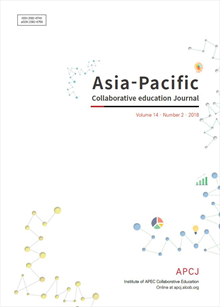간행물
Asia-Pacific Collaborative education Journal

- 발행기관 APEC국제교육협력원
- 자료유형 학술지
- 간기 반년간
- ISSN 2092-674X (Print)2092-6758 (Online)
- 수록기간 2004 ~ 2021
- 주제분류 사회과학 > 교육학 사회과학 분류의 다른 간행물
- 십진분류KDC 371DDC 379
권호리스트/논문검색
Volume 10 Number 1 (2014년 6월) 3건
1.
2014.06
구독 인증기관 무료, 개인회원 유료
Malaysia is currently implementing the use of the Frog Virtual Learning Environment (VLE) in all government schools in the country. This paper outlines the basis for introducing the VLE in leveraging teaching and learning in Malaysian schools. It discusses the state of current literature associated with the use of VLE. In addition, it articulates the need for programme evaluation as a means for decision-makers to plan and take necessary corrective action to better implement VLE among teachers and students in schools. To sustain the implementation of this endeavour, a monitoring and evaluation mechanism must be put in place. This would determine how the VLE is performing and ascertain key success factors with the use of the Frog VLE among teachers and students. For this purpose, a survey research was undertaken using a sample comprising 426 teachers and 223 students from primary and secondary schools throughout the country. Reliability computations show Cronbach alpha values greater than .90 for the various constructs in the scaled items of the teachers’ and students’ questionnaires. The key findings of the study show significantly different perceptions (p < .05) in the use of Frog VLE as a learning tool between primary pupils and secondary students with significantly higher perceptions from secondary students on all aspects ranging from ease of use of Frog VLE to using Frog VLE as a collaborative tool for interaction within and outside the classroom. Factor analysis via the Principal Component Analysis method shows 3 critical success factors cited by teachers in the use of Frog VLE. The first factor concerns the functionality of VLE as a pedagogical tool; the second is associated with the user-friendliness of the VLE; and the third concerns the VLE as a tool for collaboration. An analysis of ranks derived from the mean computations of the variables within the first factor shows the VLE provides a platform for teachers to share ideas and opinions being ranked first. This is followed by VLE being used by students to obtain learning materials, which is ranked second. Third, the VLE being used by teachers to source for new teaching materials. Other major findings include issues associated with slow and unstable internet connectivity where secondary schools fared worse compared to primary schools and that rural schools tended to have more problems in connectivity as compared to urban schools. This paper puts forth a proposition that educational technology needs continuous monitoring and evaluation and effective change management is imperative to attain success in its implementation.
5,100원
2.
2014.06
구독 인증기관 무료, 개인회원 유료
The Asia-Pacific region is an engine of global growth in political, economic, social and cultural aspects but tangible and intangible conflicts also remain in the region due to different backgrounds and experiences in history, culture, and so forth. In this respect, APEC has played its role to narrow divides and facilitate cooperative activities among 21 member economies since 1989. However, it is required to point out how these member economies can initiate and manage cooperative activities efficiently under challenging situations like recent economic crisis and remaining conflicts. This paper presents the role of education to enable member economies to understand each other and find a way to work together, and reviews one representative international educational APEC project: APEC Future Education Forum.
4,000원
3.
2014.06
구독 인증기관 무료, 개인회원 유료
4,500원

